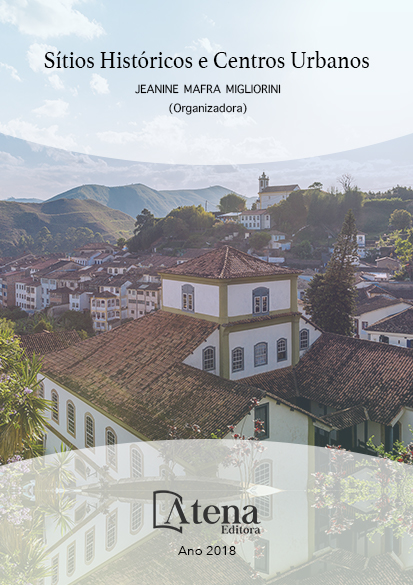
REFLEXÃO SOBRE A PRODUÇÃO ARQUITETÔNICA EM OURO PRETO DA SEGUNDA METADE DO SÉCULO XIX AO INÍCIO DO XX: RECONHECIMENTO E PRESERVAÇÃO
O presente artigo pretende discutir
o movimento eclético como uma atitude de
espírito e escolha, através da ausência de
linha única de pensamento, onde há o respeito
por uma conjunção do tempo, cuja escala e
dimensão se aproxima do homem e de sua
relação com a sociedade. A homogeneidade
da paisagem da cidade de Ouro Preto, com
suas arquiteturas coloniais e barrocas, é aqui
considerada um mito construído na década de
1930, quando a cidade foi (re)descoberta pelos
modernistas. O objetivo final desse trabalho é
analisar parte do centro histórico da cidade de
Ouro Preto buscando identificar e valorizar a
produção arquitetônica do século XIX e início do
XX em meio ao conjunto colonial, com o intuito
de reconhecer a importância dessa época na
constituição da paisagem da cidade sob a ótica
da preservação. Esse trabalho faz parte de uma
pesquisa maior que tem por objetivo produzir
um catálogo de informações sobre a produção
arquitetônica ouro-pretana, durante o século
XIX e início do XX. Para realização da pesquisa
de campo, que se encontra em andamento, a
cidade foi dividida em sete áreas, sendo neste
artigo apresentados os primeiros resultados
nos bairros da Barra e do Pilar. O trabalho se
insere na linha de pesquisa da historiografia
contemporânea, que reconhece todas as
manifestações artísticas e estéticas.
REFLEXÃO SOBRE A PRODUÇÃO ARQUITETÔNICA EM OURO PRETO DA SEGUNDA METADE DO SÉCULO XIX AO INÍCIO DO XX: RECONHECIMENTO E PRESERVAÇÃO
-
DOI: Atena
-
Palavras-chave: Ouro Preto, Ecletismo, século XIX, patrimônio.
-
Keywords: Ouro Preto, Eclectism, 19th century, patrimony
-
Abstract:
The present article intends to
discuss the Eclectic Movement as an attitude
of ideology and choice, through the absence
of a single way of thinking, where there is
respect for a time conjunction, in which scale
and dimension approaches to the man and
to its relationship with society. Ouro Preto’s
homogeneous landscape, with its colonial
and baroque architectures, is considered here
as a myth constructed by the modernists in
1930, when they (re)discovered the city. The
final objective of this work is to analyze the
entire Ouro Preto’s historical center, seeking to
identify and valorize the architectural production
of the 19th century and the beginning of the
20th century allied to the colonial set, in order to
recognize the importance of this period of time
in the construction of the city’s landscape, from
the point of view of patrimonial preservation.
This work is part of a bigger research that aims to produce a catalogue of information
about Ouro Preto’s architectural production, during the 19th century and the beginning
of the 20th century. To carry out the field research, which is still in progress, the city was
divided in seven areas, being presented in this work the first results in the neighborhoods
of Barra and Pilar. The work is inserted in the contemporary historiography research
line, that recognizes all artistic and esthetical manifestations.
-
Número de páginas: 15
- Patrícia Thomé Junqueira Schettino
- Fernanda Alves de Brito Bueno


